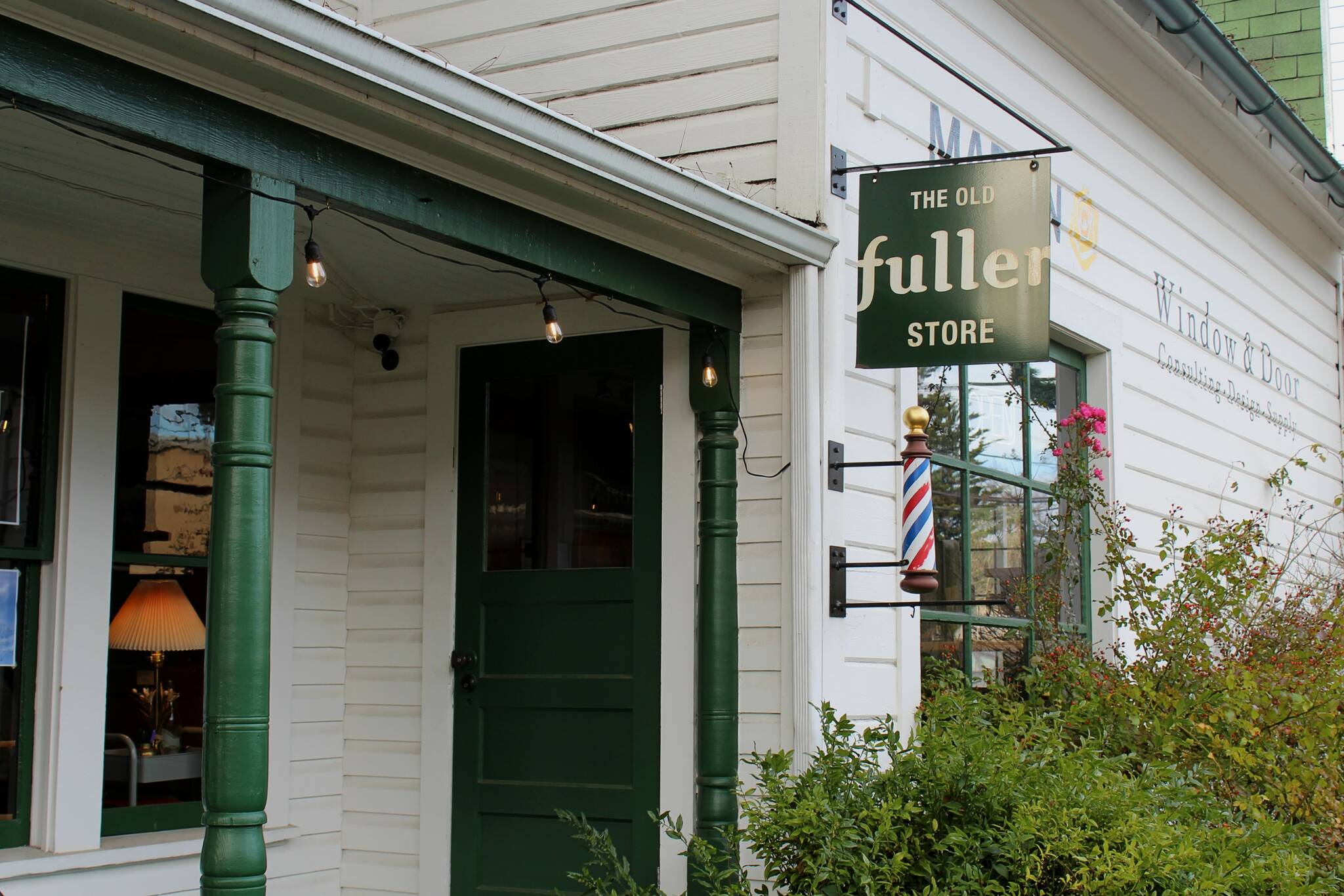At Vashon Island’s Fuller Store, a collection of four artists and small business owners is building community at the historic building at the center of the island.
The Fuller Store, a roughly 2,200-square foot landmark filled with cozy rooms and spaces, has long been home to eclectic storefronts.
The 139-year-old building is Vashon’s most historic commercial building. Sitting at the intersection of Vashon Highway and Cemetery Road, it was deemed a historical landmark by King County’s Landmarks Commission about a decade ago.
Currently home to longstanding barber Francisco Mariñez and Cherry Creek Windows & Doors, a crew of new tenants calling themselves the Old Fuller Co-op are helping grow the space to also become a home for visiting artists.
The four women at the heart of the Old Fuller co-op are Erin Bowman, owner of boutique clothing store Golden Afternoon; Tracy Chait, owner of sustainable zero-waste micro-grocer Refill Vashon; and ceramicist Carolina Silva and photographer Annie Musselman, who share a studio space.
Together, they’ve collaborated to bring artists and young people into the Fuller Store, including for a recent fundraiser for the Vashon DOVE project, which serves people who have experienced domestic violence and sexual assault. This month, they’ve brought in young artists and others from the community inside to share art and homemade crafts.
“It’s really become a hub of women, small business owners, helping each other out,” Bowman said.
Golden Afternoon
On the first floor at the store is Bowman’s Golden Afternoon, a boutique that aims to curate new and sustainable clothing.
Bowman, who has worked in the fashion industry for 20 years as a designer, opened Golden Afternoon in March. In her previous work, Bowman would make samples of apparel using new technology or fabrics that could then be showed to clothes-making factories.
Golden Afternoon fulfills a desire to run a clothing store of her own, a goal she’s had since she was little.
Her experience in fashion exposed her to the waste inherent in the industry, and she’s made it her mission to sell products that use natural or recycled fibers and avoid anything which “would sit in the landfill for a long time and pollute the environment.”
Her clothes are sourced from small, independent clothing lines which she’s vetted for workplace treatment and material usage. They include denim jackets made in California, a dress made from “deadstock” fabric originally made for curtains, and cozy jackets made from Pendleton blankets.
“There’s a lot of younger families moving onto the island,” Bowman said. “I wanted to support women that are interested in fashion, and help them know that they can buy fashionable things that are also sustainable.”
Photography and ceramics
Upstairs and to your right is an unpretentious studio space featuring the vivid animal photography of Musselman and the intricate ceramic work of Silva.
Musselman, a 23-year photographer whose intimate depictions from a Washington wildlife rehabilitation center were featured in The New Yorker in 2014, is a former journalist whose work has appeared in the New York Times and Seattle’s The Stranger.
After her mother died, Musselman found meaning in photographing animals who were healing; seeing their recovery made the vicissitudes of sickness and health, life and death feel more normal.
“I was in the middle of dealing with my mom dying, and my dad too getting sick … and the animals were like healers for me,” she said.
Silva’s ceramics and paintings share the studio space. Drawn to depictions of nature, her hand-built pieces embrace the sort of imperfections inherent to ceramics work.
Originally from Spain, Silva studied art in the U.S. and eventually settled in the Pacific Northwest 14 years ago, where she’s found deep inspiration from the natural world around her.
After carving patterning into a piece, firing it and glazing it, Silva fires the piece again — creating textured lines and shapes that make her pieces look as though they’re watercolors.
Refill Vashon
Turn around from the studio and you’ll Chait’s find Refill Vashon, packed like a wizard’s study with jars and glasses. Customers can fill their own containers here, thus taking new plastic packaging out of the equation.
Just what can you refill there? The list includes laundry, castile, dish and hand soap, vinegar sourced from her garden, Epsom salts, cleaning solution, homemade fizzing toilet tabs, lotion, shampoo, conditioner, bubble bath, homemade lip balm, stain remover and hand sanitizer, for a start.
From her teenage years, Chait’s wanted to reduce her impact on the planet. Having kids also clued her into the value of using as many non-toxic household ingredients as possible.
Chait started making her own cleaning products when her now 14-year-old first daughter was just a baby, by re-using the lemon trees at their California home. Citrus is hard to compost, Chait said, but she learned she could infuse vinegar with their peels to make a household cleaner.
She began simplifying her cabinet and taking steps to rely less on branded household supplies.
“I realized that I could just make it myself, and I would know exactly what was in everything,” she said.
A move to Vashon in 2014 intensified Chait’s passion for sustainability. Her three daughters, who are homeschooled, joined her in starting a stand at the farmers market this spring, where they sold some of their homemade concoctions. As the farmer’s market season ended, Chait saw the “for rent” sign at the Fuller Store and decided to move the operation there in September.
“The goal of the whole business is to make everybody else’s lives more efficient,” Chait said. “And you could use fewer products overall, shop locally instead of leaving the island.”



